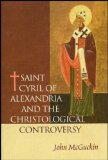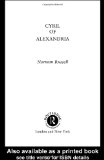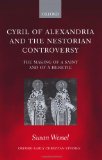Relevant
books
available at Amazon
Many
Cyril
translations
and studies
with links to Amazon
 
John McGuckin -----
 
Norman Russell -----
 
Susan Wessel |
1. If anyone will not confess that the Emmanuel is
very God, and that therefore the Holy Virgin is the Mother of God, inasmuch as
in the flesh she bore the Word of God made flesh [as it is written, “The Word
was made flesh”] let him be anathema.
2. If anyone shall not confess that the Word of God the Father is united
hypostatically to flesh, and that with that flesh of his own, he is one only
Christ both God and man at the same time: let him be anathema.
3. If anyone shall after the [hypostatic] union divide the hypostases in the one
Christ, joining them by that connexion alone, which happens according to
worthiness, or even authority and power, and not rather by a coming together,
which is made by natural union: let him be anathema.
4. If anyone shall divide between two persons or subsistences those expressions
which are contained in the Evangelical and Apostolical writings, or which have
been said concerning Christ by the Saints, or by himself, and shall apply some
to him as to a man separate from the Word of God, and shall apply others to the
only Word of God the Father, on the ground that they are fit to be applied to
God: let him be anathema.
5. If anyone shall dare to say that the Christ is a Theophorus [that is,
God-bearing] man and not rather that he is very God, as an only Son through
nature, because “the Word was made flesh,” and “hath a share in flesh and blood
as we do:” let him be anathema.
6. If anyone shall dare say that the Word of God the Father is the God of Christ
or the Lord of Christ, and shall not rather confess him as at the same time both
God and Man, since according to the Scriptures, “The Word was made flesh”: let
him be anathema.
7. If anyone shall say that Jesus as man is only energized by the Word of God,
and that the glory of the Only-begotten is attributed to him as something not
properly his: let him be anathema.
8. If anyone shall dare to say that the assumed man ought to be worshipped
together with God the Word, and glorified together with him, and recognised
together with him as God, and yet as two different things, the one with the
other (for this “Together with” is added [i.e., by the Nestorians] to convey
this meaning); and shall not rather with one adoration worship the Emmanuel and
pay to him one glorification, as [it is written] “The Word was made flesh”: let
him be anathema.
9. If any man shall say that the one Lord Jesus Christ was glorified by the Holy
Ghost, so that he used through him a power not his own and from him received
power against unclean spirits and power to work miracles before men and shall
not rather confess that it was his own Spirit through which he worked these
divine signs; let him be anathema.
10. Divine Scripture says, that Christ became High Priest and Apostle of our
confession, and that he offered himself for us a sweet-smelling savour to God
the Father. Whosoever shall say that it is not the divine Word himself, when he
was made flesh and had become man as we are, but another than he, a man born of
a woman, yet different from him, who is become our Great High Priest and
Apostle; or if any man shall say that he offered himself in sacrifice for
himself and not rather for us, whereas, being without sin, he had no need of
offering or sacrifice: let him be anathema.
11. Whosoever shall not confess that the flesh of the Lord giveth life and that
it pertains to the Word of God the Father as his very own, but shall pretend
that it belongs to another person who is united to him [i.e., the Word] only
according to honour, and who has served as a dwelling for the divinity; and
shall not rather confess, as we say, that that flesh giveth life because it is
that of the Word who giveth life to all: let him be anathema.
12. Whosoever shall not recognize that the Word of God suffered in the flesh,
that he was crucified in the flesh, and that likewise in that same flesh he
tasted death and that he is become the first-begotten of the dead, for, as he is
God, he is the life and it is he that giveth life: let him be anathema.
|

